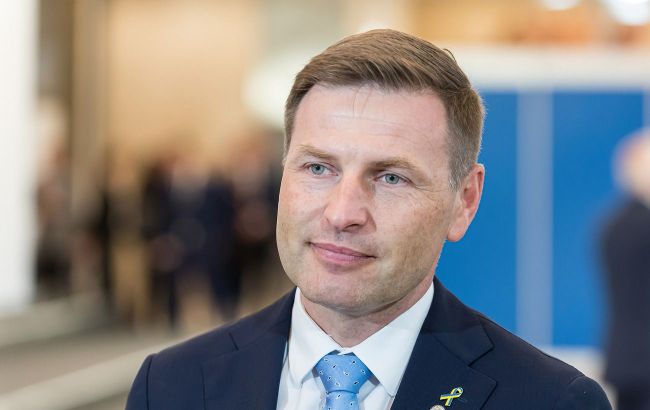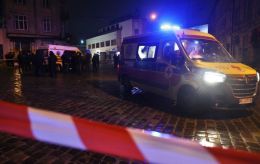'I hope that victory will come this year' - Estonian Minister of Defense
 Estonian Minister of Defense Hanno Pevkur (Photo: Getty Images)
Estonian Minister of Defense Hanno Pevkur (Photo: Getty Images)
Small Estonia, with a population of less than one and a half million, stands out as a global leader in supporting Ukraine, having already allocated 1.3% of its GDP, more than any other nation. In all political and diplomatic matters, particularly concerning Ukraine's NATO aspirations, Estonia consistently upholds a pro-Ukrainian stance.
According to Estonian Defense Minister, Hanno Pevkur, he hopes that victory will come this year. However, unlike many others, he does not believe that the breakup of Russia is an imminent matter. Minister Pevkur discussed Ukraine's NATO invitation, international security guarantees, the Ukrainian counteroffensive, the role of Yevgeny Prigozhin, and the future of Russia in an interview with RBC-Ukraine.
First of all, I would like to talk with you about the recent summit in Vilnius. Were there any chances for the results of the summit to be better for Ukraine regarding the wording of our invitation to NATO?
Well, we have to be realistic. When we have 31 chefs in one kitchen and they all have to prepare ratatouille, then everybody would like to be the chef de cuisine. So in this situation, you have to find a compromise. And I believe that the compromise, that was agreed, was the best possible realistic compromise at this very moment.
What is important and what Estonia pushed a lot, is that in that wording we reiterate that Ukraine belongs to NATO'. We achieved that there is a path for Ukraine to be a member of NATO. We achieved the withdrawal of the Membership Action Plan. We achieved to say clearly also that Ukraine belongs to NATO, all the leaders of the world, even Joe Biden said that clearly. So we also got a G7 declaration for security.
We also got a comprehensive assistance package for Ukraine. So in this very moment, looking also back, let's say one month, looking at what was said by many countries, this compromise, that was achieved in Vilnius, was a really good step forward for Ukraine.
It is not a big secret that the discussions about the text of the final communique were quite hard and quite intensive. What is the reason for that? Are some of the NATO members still very much afraid of so-called 'escalation' or Russia's overreaction to some things and this drives their policy?
As I said, when we have 31 chefs in the kitchen, all of them are top chefs and then it's not easy to find the balance of the salt and pepper. And this is why I believe that it is important to look at what was the compromise and what we achieved together, and that we still keep the unity, and we still give a clear understanding for Ukraine that the place of Ukraine is in NATO and we will be together with Ukraine so far as long as it takes, also, militarily.
But do you understand the reason why so many Ukrainians are sort of frustrated with this communique?
But it's more important what are the actual steps, not the papers. In that regard, we all understand what President Zelenskyy also has said many times, that we have to win this war before we can make the next steps. Also, I believe, every Ukrainian knows that being a member of the European Union or NATO means that Ukraine needs to take additional steps.
So it's a process, as my prime minister said, we cannot draft Ukraine into NATO. We have to bring you in with real steps. And this is one of the steps – what was made in Vilnius. So my understanding is definitely that we have to concentrate more and more on what we do, and not on what is exactly on the paper, because all the leaders of the world have said that the place of Ukraine is in NATO.
Does Ukraine's invitation to NATO depend only on security considerations and ending the war? Or may some other obstacles emerge, like making reforms and so on?
Well, the basic principle of being in NATO is that you accept all the rules of a democratic world, which are clear also for Ukraine, I believe. We know that the accession process to the European Union means that you have to fulfill certain criteria. And basically, you can draw the line between these criteria also to the criteria of NATO. Obviously, it's a military organization first of all. But this military organization also looks at the developments in society because you have to be ready to meet the criteria of the European Union as much as you have to be ready to meet the criteria of NATO. So in that sense, I believe there is a clear path now for Ukraine. But first and foremost, once again we have to end this war and then we can talk about the next steps.
Do you think that the international security guarantees may be a really working mechanism that will allow Ukraine to defend itself in the future? And does Estonia consider joining them?
Well, when we take the G7 declaration, then for me it is more important what comes next because this declaration says the basic guidelines, and framework. And also for me, from the Estonian perspective, it's more important what we do bilaterally, what kind of military help we will send, what kind of experts we will send to make reforms in the court system, in the prosecutor's office, in the legislation. So we have done that earlier and definitely also we will continue with that help. And I believe this is what Ukraine really needs.
 Photo: President of the U.S. Joe Biden and NATO Secretary-General Jens Stoltenberg (nato.int)
Photo: President of the U.S. Joe Biden and NATO Secretary-General Jens Stoltenberg (nato.int)
All in all, do you think that one may call this summit 'historical' for Ukraine and NATO, as many people hoped it to be before the start of the summit?
Every NATO summit is historical in the sense that we have NATO summits only once a year. So in Madrid, we agreed mostly on the security guarantees for NATO itself. Now we made the next step forward also for the NATO members. And once again, when I take all these decisions at the end of the day for Ukraine, canceling the membership action plan, comprehensive assistant package, G7 declaration, also the wording of communique that you belong to NATO, and there is a path for that – then putting this all together, I definitely can say that this was a huge or big step forward also for Ukraine in this path, to becoming a member of NATO.
Let's get to the Western military support to Ukraine. You once said that Western support maybe ten times bigger than it is in reality. So why doesn't it happen? Why isn't it bigger?
Well, it's not a question to me…
Sure, Estonia is number one here.
But nevertheless, we will also continue our help and we will send in September the next hospital to Ukraine, and some other aid packages will be there. But I believe that many countries just have to do more themselves in order to ramp up production, in order to make new contracts also for themselves, in order to give help to Ukraine. And as always, at the end of the day, it's a political decision: how much you can give and how much you will give. So we saw also after Vilnius Summit or during the Vilnius Summit that the full package (also Minister Reznikov has stated that) is approximately 1.2 billion new commitments and this is definitely a big help.
So all in all the help is increasing. But as was said during the summit, we can compare the Western response to the dictator as running 100 meters or a marathon. The dictator will start running the 100 meters, but we are running the marathon and you know that this marathon is a long process.
You've said that this is a political decision, how much assistance to give to Ukraine? If you look at some time perspective, do you see that this political will to make these decisions generally all over NATO, all over Western allies, does it remain at the same level as it used to be? Does it decrease? Does it increase?
It is very difficult to make any speculations on that because we know that there is a commitment said recently in Vilnius by all the world leaders that we will stay together with Ukraine as long as it takes. This is important. Now what we have to see and what we have to look into is what are the specific needs. In addition, definitely, we cannot only talk about fighter jets or some specific needs because the battlefield needs much more. We are at the moment discussing creating an IT coalition together, this is what Estonia and Luxembourg are pushing. Also in the cyber field, there is a lot to do. Therefore, in that sense, this is exactly why we have the Ramstein format. In Ramstein format we describe the needs from the Ukrainian side and also from the allies, what we can send.
At the summit, there was a small sort of scandal when the UK Secretary of Defense Ben Wallace said that his country is not an 'Amazon' and that the Western people and Western nations want to see more gratitude from Ukraine. What do you think about that? And there was Zelenskyy's reaction to this, also very widely discussed.
Zelenskyy's reaction was on the tables of the leaders at the same minute when it came out. Definitely, all this had an impact also on the wording. But I'm very glad that at the end of the day, we had very good wording. Of course, people are emotional, especially when we talk about Ukrainians. You are at war. You cannot compare anything to that. It is definitely a stressful situation. Therefore, my suggestion in these situations is always to take ten extra seconds before saying anything.
You mentioned Zelenskyy's reaction – you talk about that tweet that was very widely discussed. But I meant Zelenskyy's reaction to Mr. Wallace's words, which was pure sarcasm, like 'OK, every time we wake up in the morning we will say 'thank you' if this is what Mr. Wallace wants'. Was this sarcastic tone correct, is it helpful or not?
Well, we have to understand once again that when we are sitting all together in one room, then this kind of sayings do not help a lot. Because at the end of the day, we have to find the consensus and we have to find ways to help Ukraine. And this is exactly what Putin wants, that we are arguing, we are fighting each other. My understanding is very clear that we have to keep the unity and then we have to do anything in our power to keep that unity.
Let's get to the Ukrainian counter-offensive. In your opinion, is it as slow as many people in the West think?
My understanding is very clear and I'm in constant contact also with Oleksiy Reznikov, and I also get some information from my colleagues. My understanding is clear that there is no need to put any additional pressure on Ukrainians because you know what to do. And you know that you want to move ahead faster. However, that doesn't help on the battlefield, because on the battlefield you have to make decisions according to the situation.
I know why there are difficulties, why there are challenges, but discussing that openly in the media doesn't help a bit. What helps is more weapons and more help to Ukraine, to the battlefield, that these guys who are defending Ukrainian people and Ukrainian country can do their job properly.
If we imagine that Ukraine had achieved more success, more visible success in its counter-offensive before the wilderness summit, could the decisions of the Vilnius summit be better for Ukraine?
They would not be different. I don't see that because if you have 10 km more in one or another position, or you have 50 km more in one or another position, that doesn't change the overall situation that still 100,000 km² are occupied.
So do you see any dependence between our successes on the battlefield and the amount of aid that we achieve? Everyone wants to be on the winning side. Everyone wants to help the ones who win and if they don't win, the desire to help them may fade.
Everybody wants to be on the right side of history and the right side of history is democratic way and not dictatorship. And these people who kill or who take a decision to kill civilian people and to invade countries, they have to be accountable, they have to be brought to justice. This is why I believe that there is no need to talk about that: will this help more or do you want to be on the winner's side? There is more need to talk about how to be on the right side of history and the right side of history is definitely protecting the rule of law and principles of democracy
At the sidelines of the summit, Czech President Petr Pavel said that Ukraine's window opportunities for military deoccupation of its territory would probably close by the end of this year. And after that, some other processes may start like the pressure for some sort of negotiations may increase, the desire to help Ukraine may decrease, and like that. Do you agree with such an opinion?
I know that the Ukrainian people will never surrender and I know that Ukrainian people will fight until the day when territory will be free and they will get back their own land. Any other solution is not foreseeable for Ukrainians. I've always been of the opinion that nobody can tell the Ukrainian people and Ukrainian country and its leaders what to do or how to negotiate. It's only the sole right of the Ukrainians.
We are living in a world of real politics. Okay, maybe no one will tell Ukrainians, tell Zelenskyy: you know, guys, let's go to the table of negotiations. But even without that the amount of aid may for whatever reasons become smaller and…
My answer will be the same: you can say whatever you want to Zelenskyy or whoever can say whatever he wants to Zelenskyy. These guys in the trenches and in the tanks will not stop the war before the land is not free.
So the window of opportunity will never close until victory, right?
I hope that victory will come this year. Will it come or not? Of course, Mr. Putin can end this war immediately, bringing back his army to Russia, and then the war will be over.
In your opinion, can some internal troubles in Russia, like the recent Prigozhin's mutiny, really visibly influence the course of the war, and the situation on the battlefield?
Well, we saw that it doesn't change the course of the war at all. And the course of the war from Russia depends only on the decision of Putin. So when he decides that he will continue, then he will continue. Without that decision coming from the Kremlin, there will be no political solution to that war.
But may these mutinies, revolts, and whatsoever really make Russia so unstable that it will not be able to keep waging the war anymore, and that Russia will become interested in finding this or that solution?
I don't see that, because this mutiny showed that even when Prigozhin thought maybe that some units of the regular army will join him, it didn't happen. That is a clear sign that definitely in Russia there is no force today who could make a new step like Prigozhin did. Which means that even though the Kremlin's position has been weakened, it's not weak and the Kremlin is not in the position to be afraid that someone will take away their power internally.

Photo: President of Ukraine Volodymyr Zelenskyy and NATO Secretary-General Jens Stoltenberg (nato.int)
This is a very interesting point because as you surely know, there is a very popular opinion that Prigozhin's mutiny was just the very beginning, and new uprisings, revolts, coups, or whatever will happen soon.
There is also an opinion that it was organized by FSB to understand who is the traitor and who is not.
If we take the last year, do you see that the danger of Russian aggression against your country is becoming bigger or is it at the same potential level as it used to be?
I do not like to speculate. I will only look at the facts and what has been said by Russia. Russia has always said and their position has not changed: they want to establish a gray zone between Russia and NATO, first. Secondly, that means that the strategic position of Russia has been the same and will be the same for the years to come. Thirdly, they've also announced that after Finland joined NATO, they will increase the number of forces in our neighborhood. Which brings us to the understanding that definitely the threat from Russia will not decrease at all. On the contrary, it will increase in the coming years.
Do you believe, absolutely, totally, 100% or 1000%, that in the worst possible scenario, if something happens, if Russia really starts its aggression against your country, that all the allies, I mean, the US, Germany, the UK, France will immediately rush to help and to protect you by all means that they have?
Yes, I am. Otherwise, there is no point to talk about NATO and the Western democratic world.

